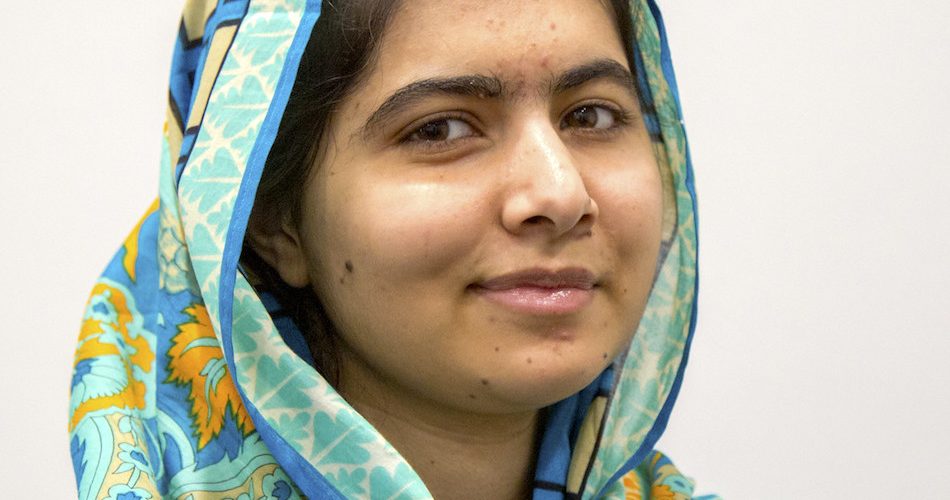(pronounced mah-LAH-lah yoo-sahf-ZIGH)
In 2014, at age 17, Malala became the youngest person to receive the Nobel Peace Prize.
The award recognized Malala’s work to assure an education for herself and other girls. Her efforts continue throughout the world today.
Malala was born July 12, 1997, in the Swat Valley of northwestern Pakistan during the Taliban’s rule of the area. Her father, Ziauddin, inspired Malala’s love of education. He founded a private school for boys and girls. The Taliban actively banned the education of girls. They destroyed many schools for educating girls. Malala continued to attend school despite the danger. She even began speaking out for the right of girls to be educated.
In September 2008, Malala gave a speech in Peshawar, Pakistan. The title was “How Dare the Taliban Take Away My Basic Right to an Education.” During 2009, at the age of 11, Malala published an anonymous diary on the BBC Urda. She wrote of life, particularly for girls, under Taliban rule. Her writings caught the interest of many in the media.
As her popularity grew, people learned her identity, and she became a target of the Taliban. On October 9, 2012, a gunman entered her school bus and asked for her by name. The gunman fired four shots into a group of girls. One of the bullets struck Malala in the head. She received medical treatment in Pakistan and later more surgeries and rehabilitation in the United Kingdom. She remained in England with her family for several years.
The shooting did not silence Malala as the Taliban had planned. She went on to speak about girls’ rights to be educated. In 2013, on her 16th birthday, she gave a speech at the United Nations. That same year she released her autobiography, I Am Malala: The Girl Who Stood Up for Education and Was Shot by the Taliban. Time Magazine named her one of the world’s most influential people.
Malala spent her 17th birthday in Nigeria. Three months earlier, Boko Haram Islamist militants had kidnapped more than 200 Nigerian schoolgirls. Malala urged Nigeria’s leader to do more to free the girls. Then, on the first anniversary of the kidnapping, Malala wrote the girls an open letter. She told the girls the world had not forgotten them. She asked them to stay strong and hopeful.
As Pope Francis addressed the United Nations on September 25, 2015, Malala watched from the balcony. She spoke afterwards, asking those present to promise an education for all children wherever they live.
The Malala Fund, established in 2013 by Malala and her father, continues to promote the education of girls throughout the world.
References
“How to pronounce the names of the 2014 Nobel Peace Prize winners.” (10 October 2014). NPR on Tumbler. Retrieved from npr.tumblr.com/post/99648368981/how-to-pronounce-the-names-of-the-2014-nobel-peace
Kedmey, D. (14 April 2015). “Read Malala Yousafzai’s letter to ‘brave sisters’ abducted by Boko Haram.” Time magazine. Retrieved from time.com/3821235/malala-yousafzai-writes-letter-brave-sisters-abducted-boko-haram/
Levs, J. (13 April 2015). “Malala’s letter to Nigeria’s abducted schoolgirls: ‘solidarity, love, and hope.’” CNN online. Retrieved from cnn.com/2015/04/13/world/malala-nigeria-schoolgirls-abducted-boko-haram/
“Malala meets Nigeria’s leader Goodluck Jonathan over abducted girls.” (14 July 2014). BBC online. Retrieved from bbc.com/news/world-africa-28292480
“Malala’s story.” (n.d.). Malala Fund online. Retrieved from www.malala.org/malalas-story
“Malala Yousafzai Biography.” (n.d.). Biography.com. Retrieved from biography.com/people/malala-yousafzai-21362253 – after-the-attack
Valby, K. (8 November 2015). “Malala strikes back: Behind the scenes of her fearless, fast-growing organization.” Fast Company magazine. Retrieved from fastcompany.com/3052875/malala-strikes-back-behind-the-scenes-of-her-fearless-organization
Image above: “Malala Yousafzai” by Simon Davis/DFID, licensed under CC BY 3.0.


